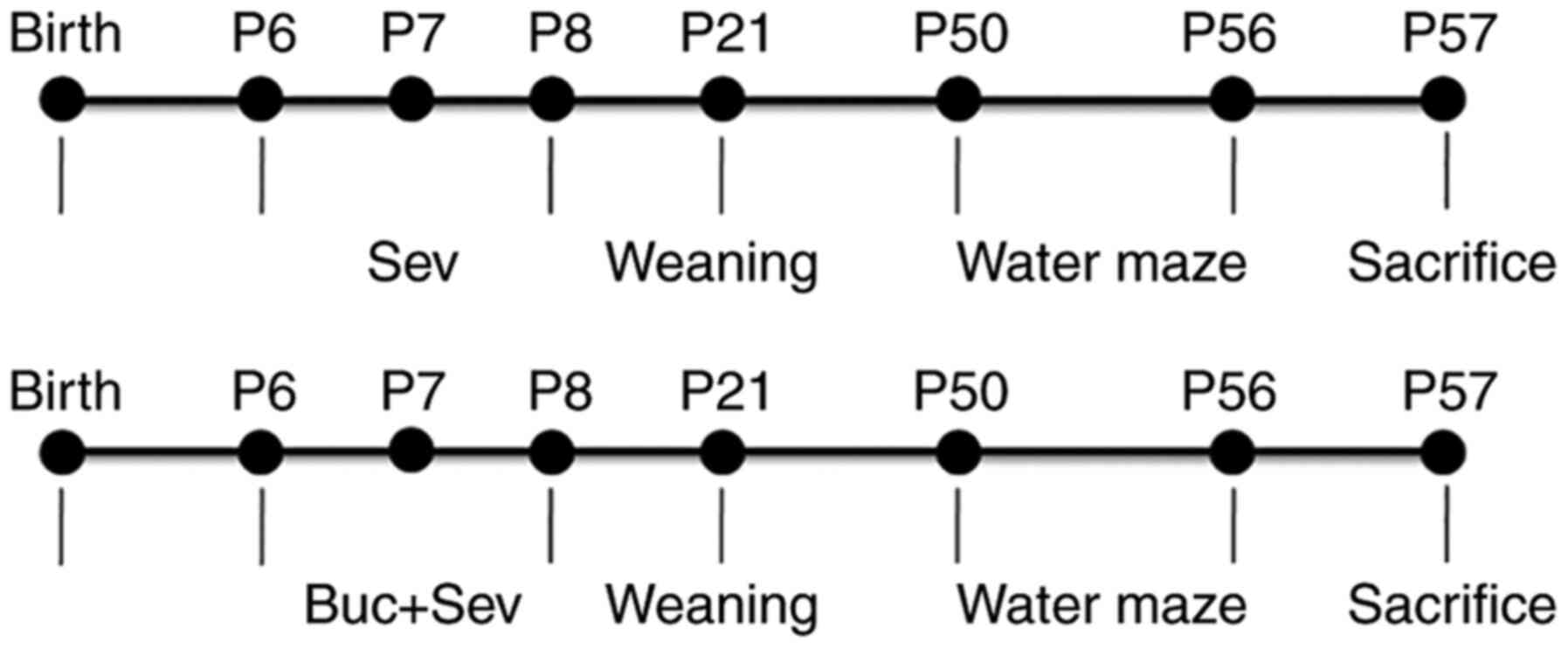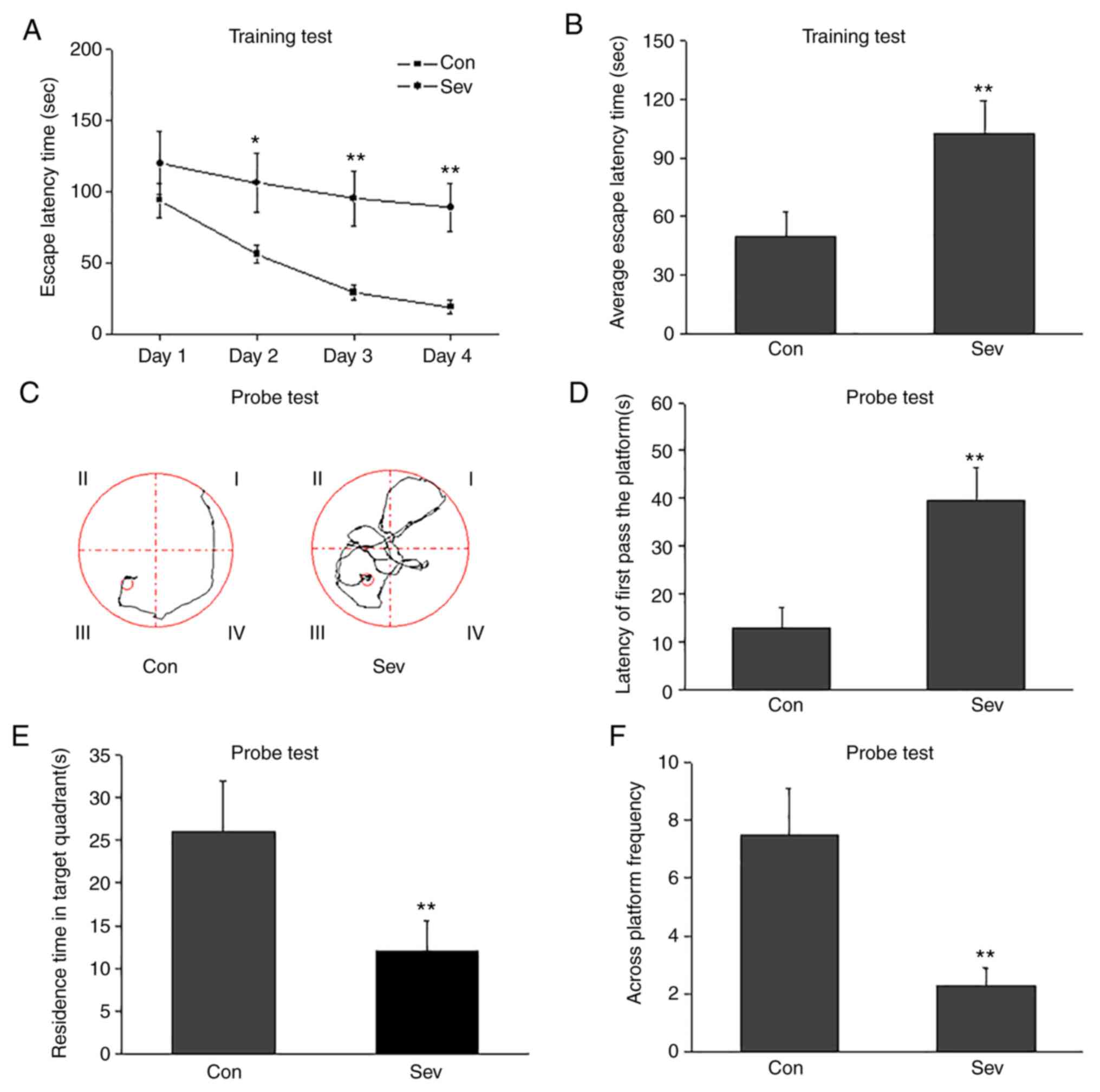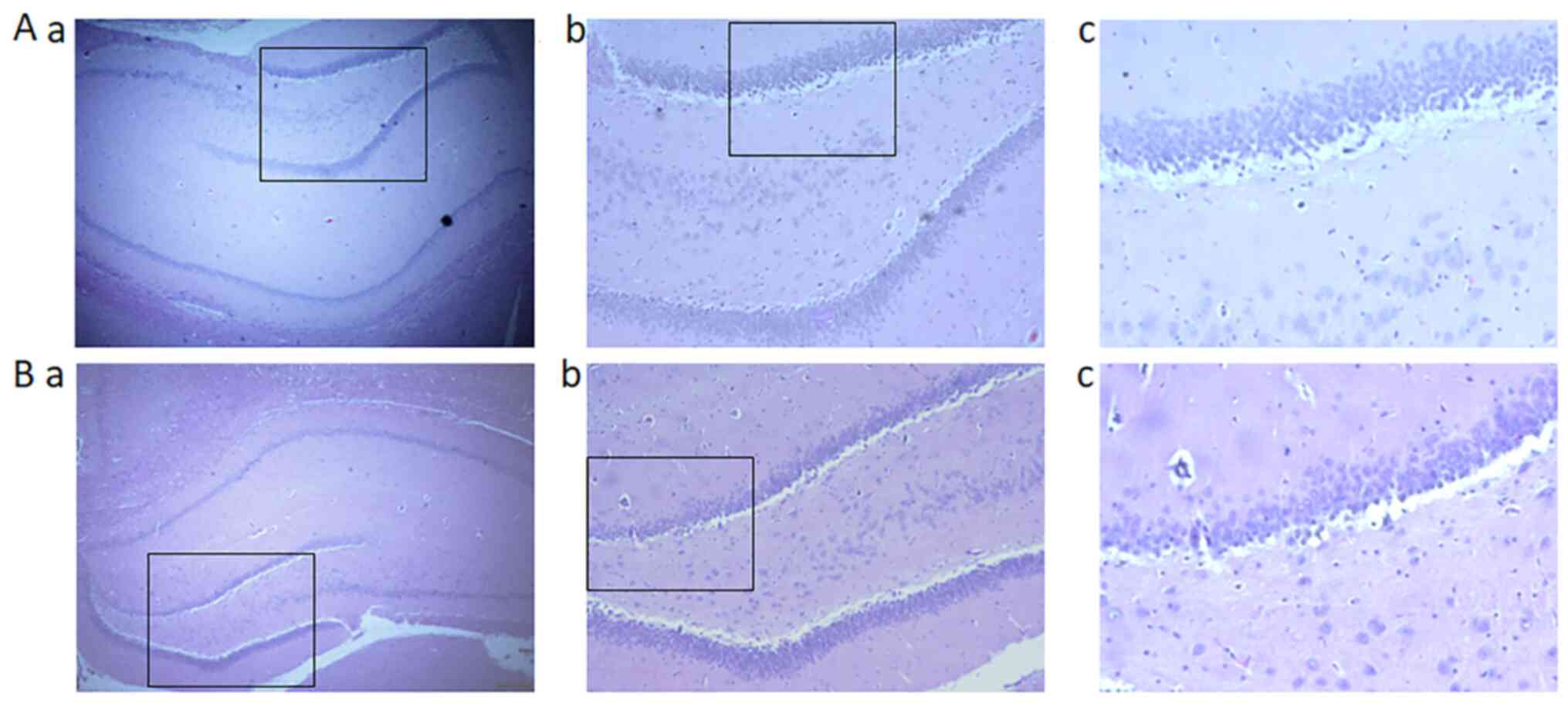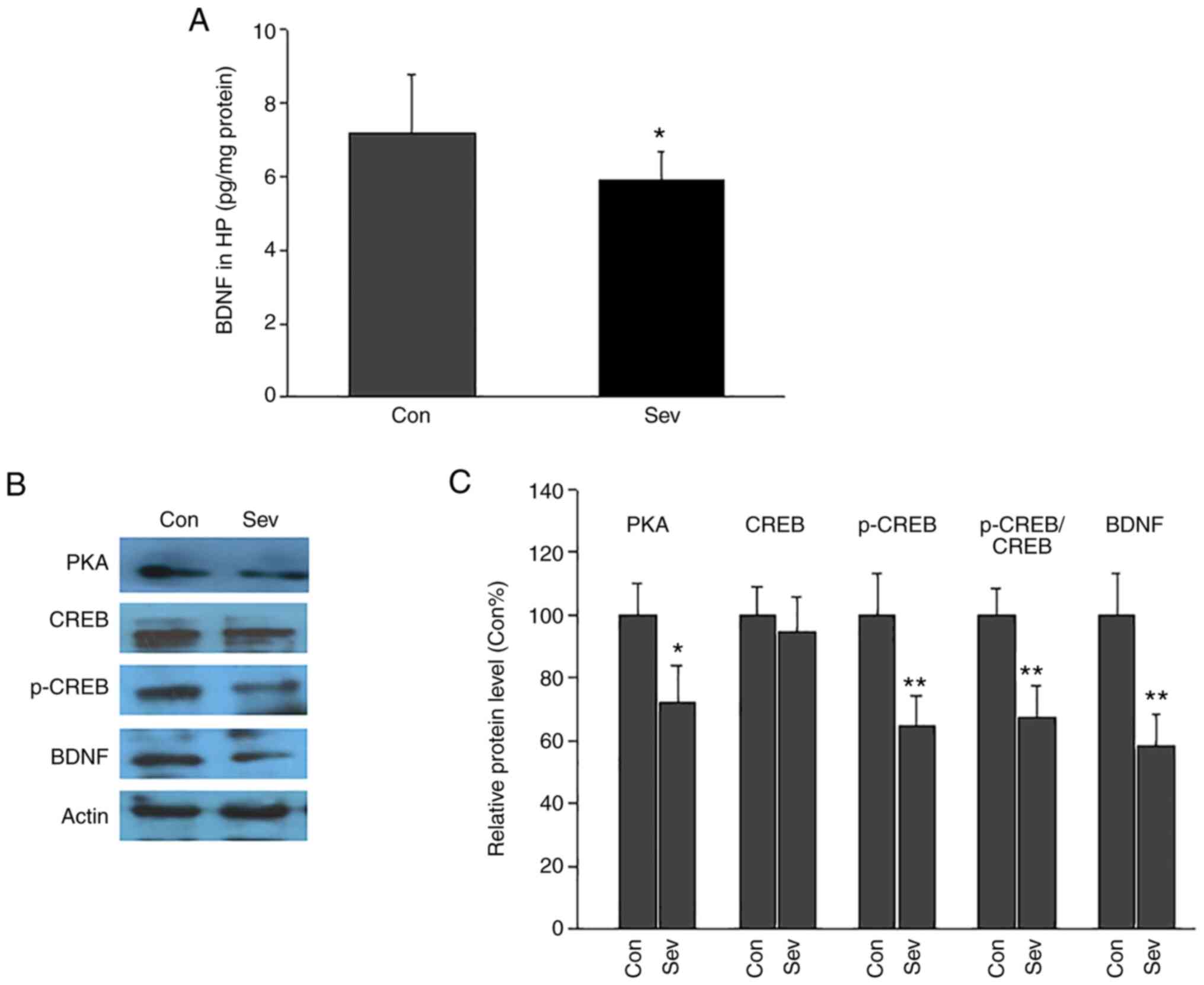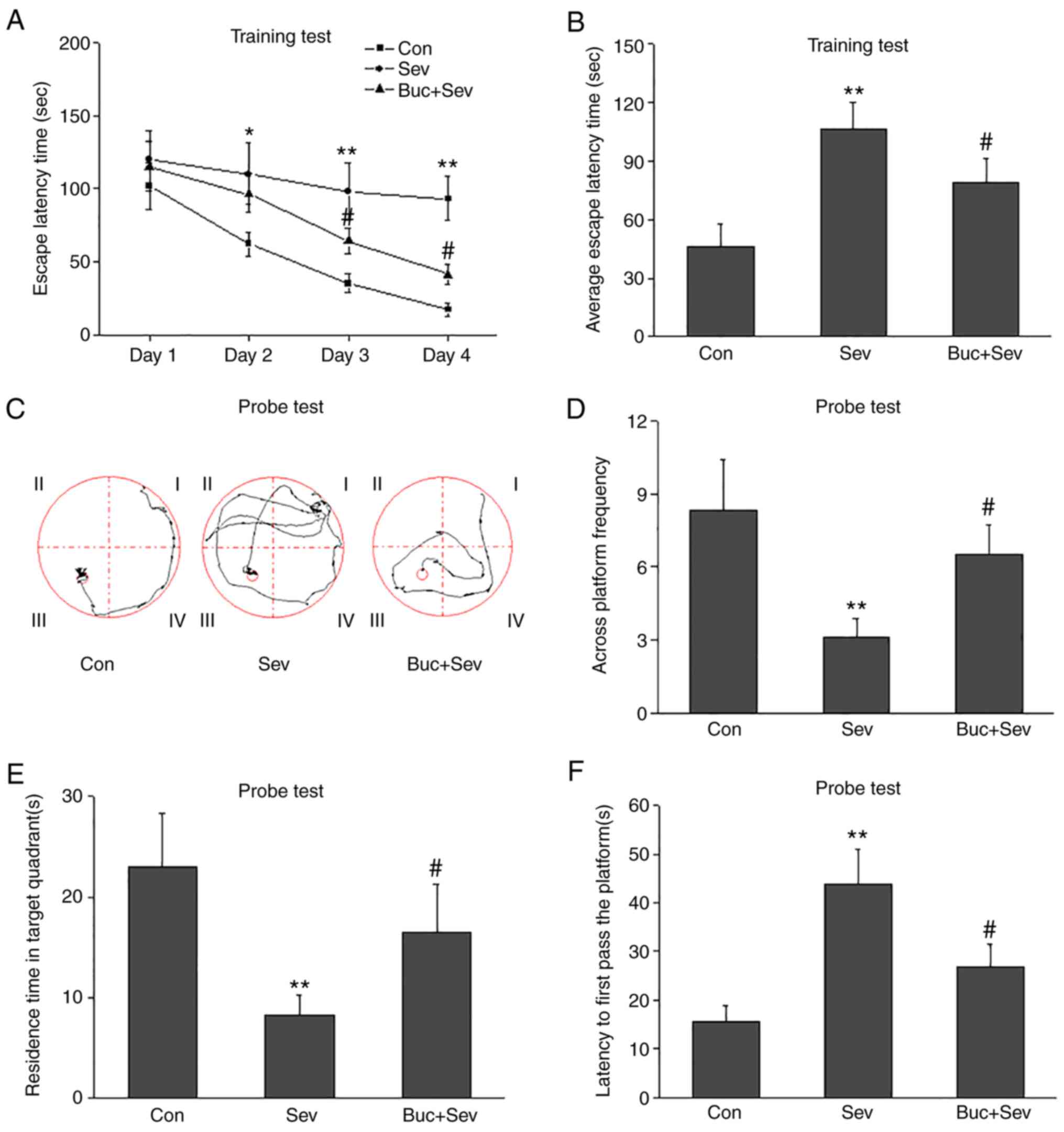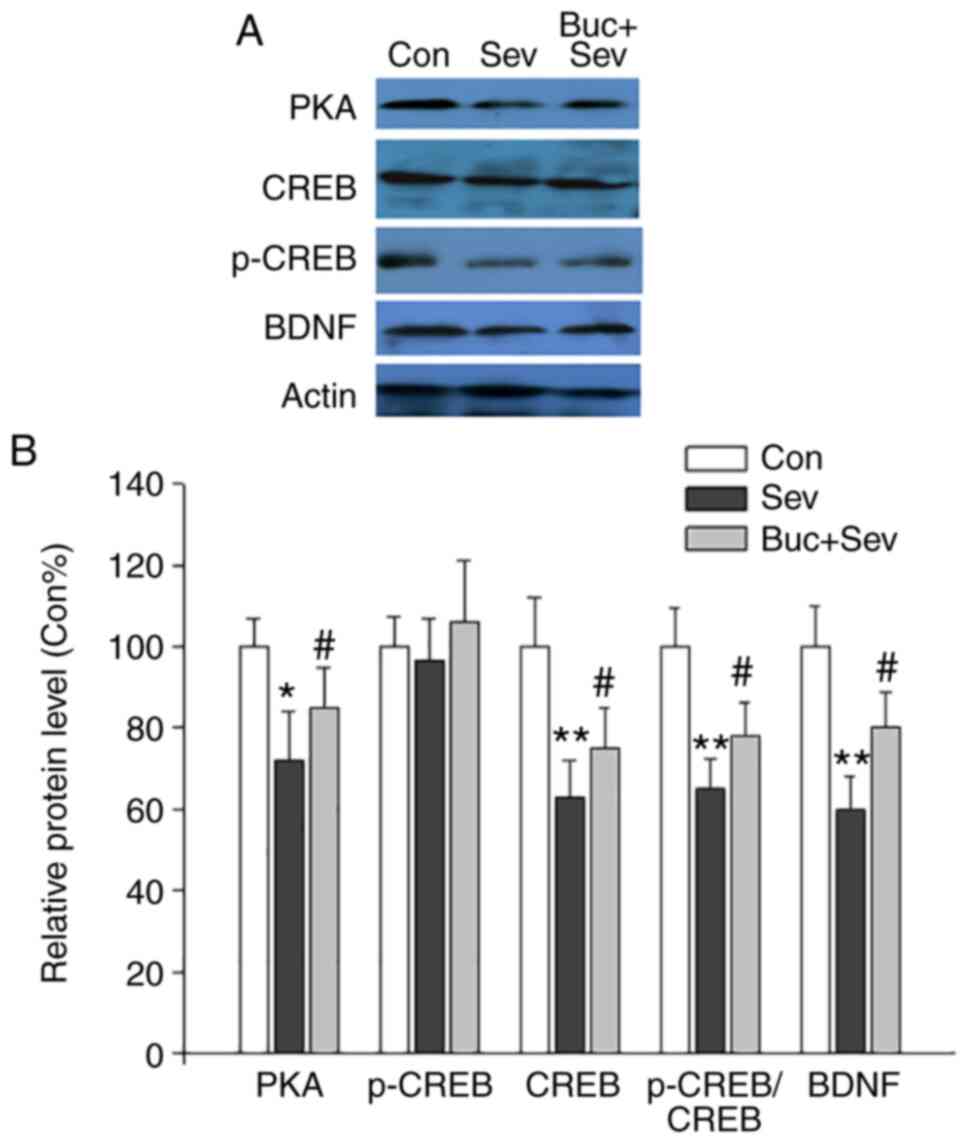|
1
|
Kim EH, Song IK, Lee JH, Kim HS, Kim HC,
Yoon SH, Jang YE and Kim JT: Desflurane versus sevoflurane in
pediatric anesthesia with a laryngeal mask airway: A randomized
controlled trial. Medicine (Baltimore). 96(e7977)2017.PubMed/NCBI View Article : Google Scholar
|
|
2
|
Noga ML, Yarr JE and Chen PE: Evaluation
of sevoflurane as an anesthetic agent for voiding
cystourethrography in pediatric patients. Can Assoc Radiol J.
63:222–227. 2012.PubMed/NCBI View Article : Google Scholar
|
|
3
|
Satomoto M, Sun Z, Adachi YU and Makita K:
Neonatal sevoflurane exposure induces adulthood fear-induced
learning disability and decreases glutamatergic neurons in the
basolateral amygdala. J Neurosurg Anesthesiol. 30:59–64.
2018.PubMed/NCBI View Article : Google Scholar
|
|
4
|
Karaman T, Karaman S, Doğru S, Tapar H,
Şahin A and Süren M: Short-term and long-term effects of
dexamethasone on cognitive dysfunction induced by sevoflurane in
adult rats. Turk J Anaesthesiol Reanim. 45:158–163. 2017.PubMed/NCBI View Article : Google Scholar
|
|
5
|
Sun GY, Xie K, Sun ZY, Sun MY and Li N:
Sevoflurane induces temporary spatial working memory deficits and
synaptic ultrastructure impairments in the hippocampus of neonatal
rats. Eur Rev Med Pharmacol Sci. 23:2620–2629. 2019.PubMed/NCBI View Article : Google Scholar
|
|
6
|
Zheng SQ, An LX, Cheng X and Wang YJ:
Sevoflurane causes neuronal apoptosis and adaptability changes of
neonatal rats. Acta Anaesthesiol Scand. 57:1167–1174.
2013.PubMed/NCBI View Article : Google Scholar
|
|
7
|
Andropoulos DB: Effect of anesthesia on
the developing brain: Infant and fetus. Fetal Diagn Ther. 43:1–11.
2018.PubMed/NCBI View Article : Google Scholar
|
|
8
|
Popova NK, Ilchibaeva TV and Naumenko VS:
Neurotrophic factors (BDNF and GDNF) and the serotonergic system of
the brain. Biochemistry (Mosc). 82:308–317. 2017.PubMed/NCBI View Article : Google Scholar
|
|
9
|
Leal G, Bramham CR and Duarte CB: BDNF and
hippocampal synaptic plasticity. Vitam Horm. 104:153–195.
2017.PubMed/NCBI View Article : Google Scholar
|
|
10
|
Tao X, Finkbeiner S, Arnold DB, Shaywitz
AJ and Greenberg ME: Ca2+ influx regulates BDNF
transcription by a CREB family transcription factor-dependent
mechanism. Neuron. 20:709–726. 1998.PubMed/NCBI View Article : Google Scholar
|
|
11
|
Yin Y, Gao D, Wang Y, Wang ZH, Wang X, Ye
J, Wu D, Fang L, Pi G, Yang Y, et al: Tau accumulation induces
synaptic impairment and memory deficit by calcineurin-mediated
inactivation of nuclear CaMKIV/CREB signaling. Proc Natl Acad Sci
USA. 113:E3773–E3781. 2016.PubMed/NCBI View Article : Google Scholar
|
|
12
|
West AE, Chen WG, Dalva MB, Dolmetsch RE,
Kornhauser JM, Shaywitz AJ, Takasu MA, Tao X and Greenberg ME:
Calcium regulation of neuronal gene expression. Proc Natl Acad Sci
USA. 98:11024–11031. 2001.PubMed/NCBI View Article : Google Scholar
|
|
13
|
Sharma N, Lopez DI and Nyborg JK: DNA
binding and phosphorylation induce conformational alterations in
the kinase-inducible domain of CREB. Implications for the mechanism
of transcription function. J Biol Chem. 282:19872–19883.
2007.PubMed/NCBI View Article : Google Scholar
|
|
14
|
Guo Y and Feng P: OX2R activation induces
PKC-mediated ERK and CREB phosphorylation. Exp Cell Res.
318:2004–2013. 2012.PubMed/NCBI View Article : Google Scholar
|
|
15
|
Al Rahim M, Nakajima A, Saigusa D, Tetsu
N, Maruyama Y, Shibuya M, Yamakoshi H, Tomioka Y, Iwabuchi Y,
Ohizumi Y and Yamakuni T: 4'-Demethylnobiletin, a bioactive
metabolite of nobiletin enhancing PKA/ERK/CREB signaling, rescues
learning impairment associated with NMDA receptor antagonism via
stimulation of the ERK cascade. Biochemistry. 48:7713–7721.
2009.PubMed/NCBI View Article : Google Scholar
|
|
16
|
Bi C, Cai Q, Shan Y, Yang F, Sun S, Wu X
and Liu H: Sevoflurane induces neurotoxicity in the developing rat
hippocampus by upregulating connexin 43 via the JNK/c-Jun/AP-1
pathway. Biomed Pharmacother. 108:1469–1476. 2018.PubMed/NCBI View Article : Google Scholar
|
|
17
|
Sharifzadeh M, Zamanian AR, Gholizadeh S,
Tabrizian K, Etminani M, Khalaj S, Zarrindast MR and Roghani A:
Post-training intrahippocampal infusion of nicotine-bucladesine
combination causes a synergistic enhancement effect on spatial
memory retention in rats. Eur J Pharmacol. 562:212–220.
2007.PubMed/NCBI View Article : Google Scholar
|
|
18
|
Hosseini-Zare MS, Salehi F, Seyedi SY,
Azami K, Ghadiri T, Mobasseri M, Gholizadeh S, Beyer C and
Sharifzadeh M: Effects of pentoxifylline and H-89 on epileptogenic
activity of bucladesine in pentylenetetrazol-treated mice. Eur J
Pharmacol. 670:464–470. 2011.PubMed/NCBI View Article : Google Scholar
|
|
19
|
Yang Y, Wang L, Wu Y, Su D, Wang N, Wang
J, Shi C, Lv L and Zhang S: Tanshinol suppresses inflammatory
factors in a rat model of vascular dementia and protects
LPS-treated neurons via the MST1-FOXO3 signaling pathway. Brain
Res. 1646:304–314. 2016.PubMed/NCBI View Article : Google Scholar
|
|
20
|
Yu M, Han C, Zhou Q, Liu C and Ding Z:
Clinical effects of sevoflurane anesthesia induction with a
portable inhalational anesthetic circuit in pediatric patients.
Arch Med Sci. 11:796–800. 2015.PubMed/NCBI View Article : Google Scholar
|
|
21
|
Salehi F, Hosseini-Zare MS, Aghajani H,
Seyedi SY, Hosseini-Zare MS and Sharifzadeh M: Effect of
bucladesine, pentoxifylline, and H-89 as cyclic adenosine
monophosphate analog, phosphodiesterase, and protein kinase A
inhibitor on acute pain. Fundam Clin Pharmacol. 31:411–419.
2017.PubMed/NCBI View Article : Google Scholar
|
|
22
|
Brickman AM, Khan UA, Provenzano FA, Yeung
LK, Suzuki W, Schroeter H, Wall M, Sloan RP and Small SA: Enhancing
dentate gyrus function with dietary flavanols improves cognition in
older adults. Nat Neurosci. 17:1798–1803. 2014.PubMed/NCBI View
Article : Google Scholar
|
|
23
|
Numakawa T, Suzuki S, Kumamaru E, Adachi
N, Richards M and Kunugi H: BDNF function and intracellular
signaling in neurons. Histol Histopathol. 25:237–258.
2010.PubMed/NCBI View Article : Google Scholar
|
|
24
|
Andero R, Choi DC and Ressler KJ:
BDNF-TrkB receptor regulation of distributed adult neural
plasticity, memory formation, and psychiatric disorders. Prog Mol
Biol Transl Sci. 122:169–192. 2014.PubMed/NCBI View Article : Google Scholar
|
|
25
|
Guo W, Nagappan G and Lu B: Differential
effects of transient and sustained activation of BDNF-TrkB
signaling. Dev Neurobiol. 78:647–659. 2018.PubMed/NCBI View Article : Google Scholar
|
|
26
|
Ding ML, Ma H, Man YG and Lv HY:
Protective effects of a green tea polyphenol,
epigallocatechin-3-gallate, against sevoflurane-induced neuronal
apoptosis involve regulation of CREB/BDNF/TrkB and PI3K/Akt/mTOR
signalling pathways in neonatal mice. Can J Physiol Pharmacol.
95:1396–1405. 2017.PubMed/NCBI View Article : Google Scholar
|
|
27
|
Wang L, Hu XH, Huang ZX, Nie Q, Chen ZG,
Xiang JW, Qi RL, Yang TH, Xiao Y, Qing WJ, et al: Regulation of
CREB functions by phosphorylation and sumoylation in nervous and
visual systems. Curr Mol Med. 16:885–892. 2017.PubMed/NCBI View Article : Google Scholar
|
|
28
|
Dong W, Xu D, Hu Z, He X, Guo Z, Jiao Z,
Yu Y and Wang H: Low-functional programming of the CREB/BDNF/TrkB
pathway mediates cognitive impairment in male offspring after
prenatal dexamethasone exposure. Toxicol Lett. 283:1–12.
2018.PubMed/NCBI View Article : Google Scholar
|
|
29
|
Luo Y, Kuang S, Li H, Ran D and Yang J:
cAMP/PKA-CREB-BDNF signaling pathway in hippocampus mediates
cyclooxygenase 2-induced learning/memory deficits of rats subjected
to chronic unpredictable mild stress. Oncotarget. 8:35558–35572.
2017.PubMed/NCBI View Article : Google Scholar
|
|
30
|
Liu H, Jin X, Yin X, Jin N, Liu F and Qian
W: PKA-CREB signaling suppresses tau transcription. J Alzheimers
Dis. 46:239–248. 2015.PubMed/NCBI View Article : Google Scholar
|
|
31
|
Han C, Yang Y, Ruan S, Guo L, Zhang X and
Guan Q: The predictive value of serum p-CREB level on secondary
cognitive impairment in patients with mild-to-moderate
craniocerebral trauma. Neurosurg Rev. 42:715–720. 2019.PubMed/NCBI View Article : Google Scholar
|
|
32
|
Rosa E and Fahnestock M: CREB expression
mediates amyloid β-induced basal BDNF downregulation. Neurobiol
Aging. 36:2406–2413. 2015.PubMed/NCBI View Article : Google Scholar
|
|
33
|
Lu B, Nagappan G and Lu Y: BDNF and
synaptic plasticity, cognitive function, and dysfunction. Handb Exp
Pharmacol. 220:223–250. 2014.PubMed/NCBI View Article : Google Scholar
|
|
34
|
Rahmani M, Rahmani F and Rezaei N: The
brain-derived neurotrophic factor: Missing link between sleep
deprivation, insomnia, and depression. Neurochem Res. 45:221–231.
2020.PubMed/NCBI View Article : Google Scholar
|
|
35
|
Wang R and Holsinger RMD: Exercise-induced
brain-derived neurotrophic factor expression: Therapeutic
implications for Alzheimer's dementia. Ageing Res Rev. 48:109–121.
2018.PubMed/NCBI View Article : Google Scholar
|
|
36
|
Shin MS, Kim TW, Park SS, Ko IG, Kim CJ,
Kim M, Roh SY, Kim KT and Kim KH: Long-term surgical and chemical
castration deteriorates memory function through downregulation of
PKA/CREB/BDNF and c-Raf/MEK/ERK pathways in hippocampus. Int
Neurourol J. 23:116–124. 2019.PubMed/NCBI View Article : Google Scholar
|















